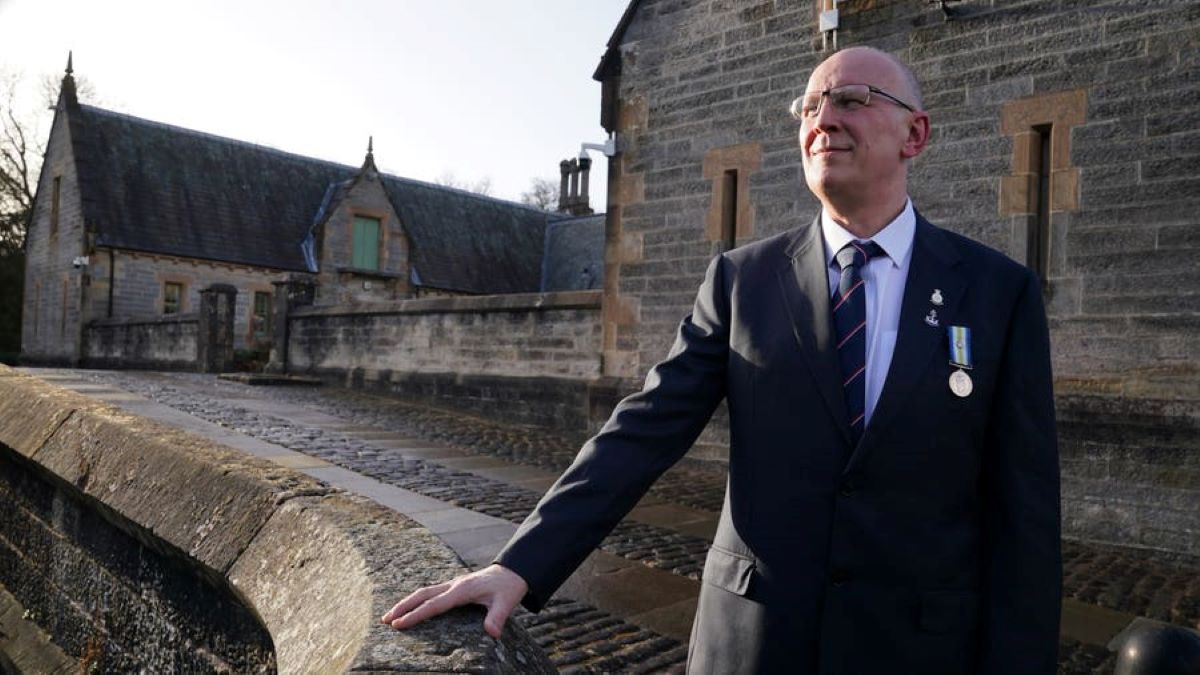Falklands War: Living with survivor’s guilt 40 years on
Norman McDade says he uses art as a way of remembering and dealing with difficult memories of his past.

A Scots veteran has said how his brother’s death in a hit-and-run made him realise he suffers with survivor’s guilt after fighting in the Falklands War four decades ago.
Norman McDade, who prefers to go by the name Mac, joined the Royal Navy aged 17 in 1978 and trained as a chef.
Four years later, in April 1982, the now 60-year-old spent 121 days at sea aboard the HMS Plymouth fighting in the South Atlantic conflict.
Despite the ship being hit and bombed multiple times, all the crew miraculously survived the 74-day long battle.
But four years after the war, Mac’s older brother Robert, a musician, was killed on the streets of Glasgow in a hit-and-run aged 25.
How could I go through what I went through, getting bombed and shot at, and yet he died
“We were really close,” Mac said, who lives in Erskine and has another older brother called Jim.
“I couldn’t accept the fact that my brother died just going about his business.
“He was in a band, and they were unloading some equipment and this guy under the influence came round the corner and lost of control of the vehicle and Robert was crushed against the back of the van.
“How could I go through what I went through, getting bombed and shot at, and yet he died.”
Mac said when he was between jobs after the war he suffered with a bad back and, often sat at home, fell into a deep depression.
It was at this point he went to see a doctor for help.
“We sat and talked, and then one day the doctor said to me, ‘Do you not think you have survivor’s guilt with what your brother went through?’
“And it all clicked.
“So, years later, after going through therapy sessions, I found out I was suffering with survivor’s guilt, and it was Robert’s death that made me see that.
“My brother and I were very close, so it was a tough time.”
Despite the horrors of the Falklands War, Mac said he escaped post-traumatic stress disorder (PTSD), a condition common to those who have fought in war, and which many of his comrades who survived live with today.
He said he believes this is down to him being stationed on the upper deck of the ship, so that he could see what was going on around him.
“I think a lot of people down below decks who couldn’t see what’s going on and just heard all these jets making horrendous noises over head made a lot of people suffer after,” he said.
“I was grateful to be on the upper deck, and I didn’t have to do any hand-to-hand fighting because I was at sea.”
Mac, who now lives in Erskine, said he uses art as a means of coping with difficult experiences in his past.
“I think art is very therapeutic, even if it’s just to keep your mind off your day job,” he said.
“I think for people who suffer from PTSD, it’s definitely something that would help.
“It’s something that I am quite interested in, and it does help me remember my experiences more and deal with things.”
Mac, who spent nine years in the Navy, has close ties with Erskine Veterans Charity.
The organisation offers various activities, including art workshops, at the Erskine Veterans Village for those who are dealing with the impact of war.
Some of Mac’s artwork will be on display in the charity’s annual Art Of Erskine exhibition this year, particularly paintings he has done on scenes of the Falklands War.
He also donated some of his paintings to the charity’s Art For Erskine auction, all of which were sold.
HMS Plymouth was one of the first Royal Navy ships to arrive in the South Atlantic for the war, along with the HMS Antrim and Brilliant.
On April 25, she took part in Operation Paraquet, the recapture of South Georgia.
Later that day, the Plymouth sailed with Endurance to Leith Harbour, which was still held by the Argentines.
The next day the garrison commander, Lieutenant commander Alfredo Astiz, signed the surrender in Plymouth’s wardroom.
The Plymouth was badly hit by Argentine fighter jets on June 8, a day that Mac said he and many others will never forget.
It was hit by four 1000lb bombs which miraculously did not explode, but caused significant damage.
Repairs were carried out through the night and the next day, restoring some of the ship’s capabilities, but it was not enough, leading to the Plymouth having to withdraw to a repair area.
She then returned to shore bombardment duties on June 14, when Argentine forces in the Falklands surrendered.
Bookmark popover
Removed from bookmarks